
This logo isn't an ad or affiliate link. It's an organization that shares in our mission, and empowered the authors to share their insights in Byte form.
Rumie vets Bytes for compliance with our
Standards.
The organization is responsible for the completeness and reliability of the content.
Learn more
about how Rumie works with partners.
History is a fascinating topic!
Studying our past helps us understand how and why we shaped the world the way it is today. Moreover, history is literally a story — full of dramatic events and interesting characters.
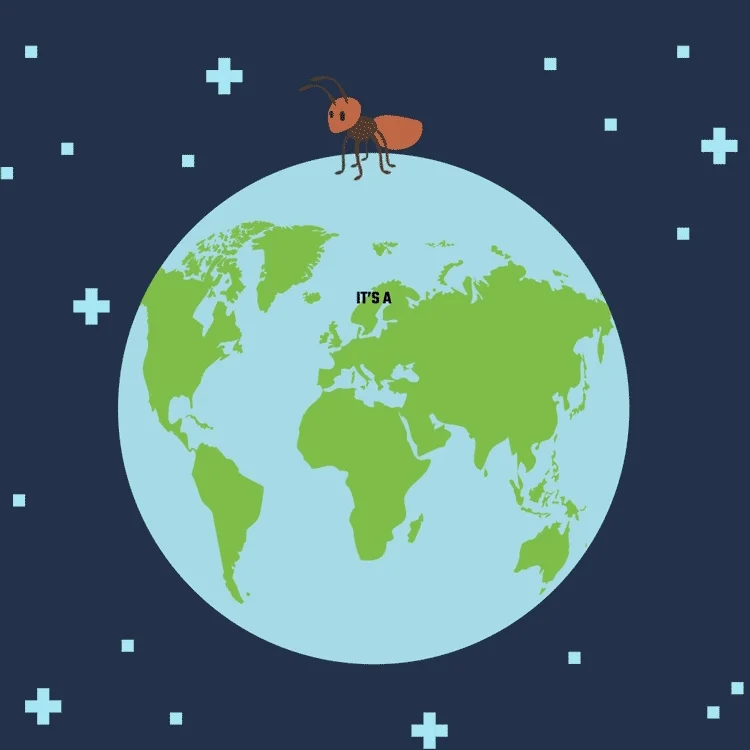
But dull textbooks and long lists of dates and facts don’t always make history feel as exciting as it could be.

Why not give ChatGPT a try for a more fun and immersive way to learn about history?
ChatGPT for Studying
ChatGPT is a groundbreaking AI text generation tool from OpenAI. You can use it in many ways to improve your productivity and learning — whether you simply need quick answers, or explanations of complex concepts.
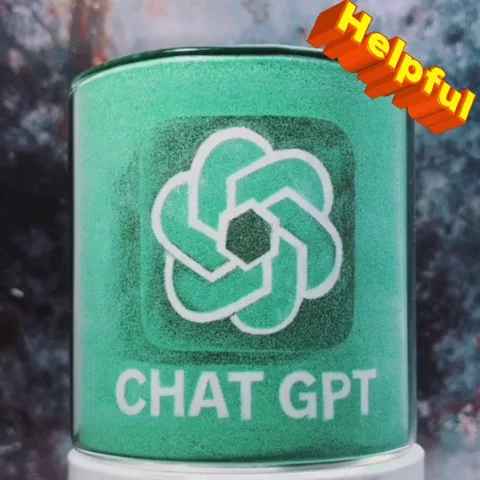
Here are some examples how ChatGPT can help you study more effectively:
Editing written content such as essays
Explaining complicated concepts
Generating original voiceovers for digital content
Summarizing books and long research papers
These are general use cases. With some creativity, you can turn them into engaging ChatGPT prompts that bring history to life.
Prompt 1: Discuss historical events
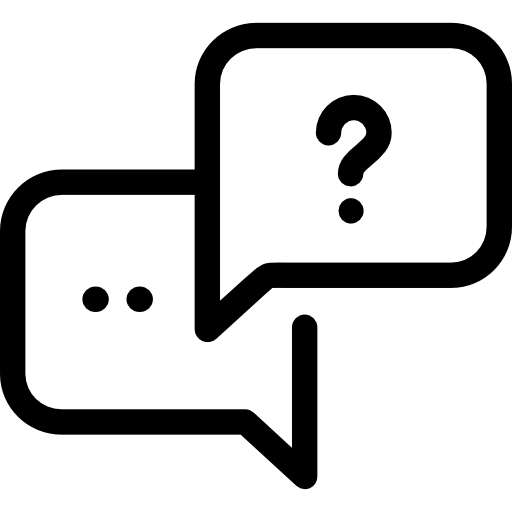 When asking ChatGPT to explain complicated concepts and ideas, or the impact of historical events, ask it to discuss the topic from different perspectives.
When asking ChatGPT to explain complicated concepts and ideas, or the impact of historical events, ask it to discuss the topic from different perspectives.
Example ChatGPT prompts:
"You're a supporter/opponent of the Boston Tea Party. Give 3 supporting arguments for each side."
"Discuss the impact of the Russian Revolution from the perspective of a landowner and a worker."
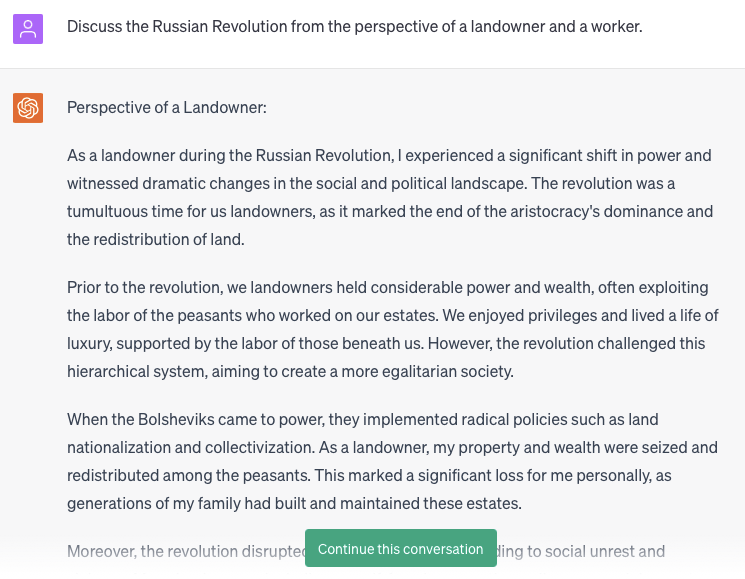
To hear the answer as an audio clip (generated by FreeTTS) click the play button below:
While the output you get from ChatGPT won't replace an actual debate with a human, it will encourage your critical thinking and allow you to evaluate historical events from different sides.
Prompt 2: Act as a historical figure
 Many of history's most famous figures are fascinating personalities. And they experienced the history you want to learn about firsthand, so why not hear from them directly?
Many of history's most famous figures are fascinating personalities. And they experienced the history you want to learn about firsthand, so why not hear from them directly?
Example ChatGPT prompts:
"Pretend you are Martin Luther King. Explain what you were thinking while writing the 'I Have a Dream' speech.”
“Act as Empress Cixi of China. Describe your daily life.”
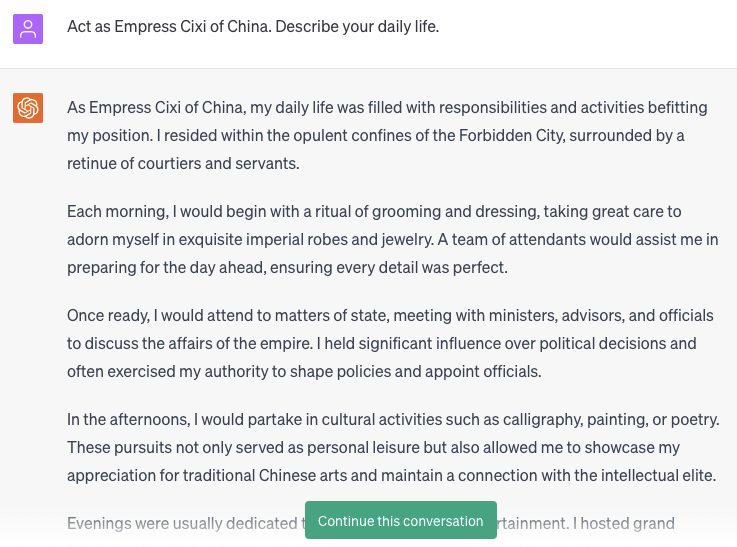
To hear the answer as an audio clip (generated by FreeTTS) click the play button below:
You can easily continue and modify your conversation with your historical 'study buddy' with follow-up questions like "Tell me about your enemies." or "What about your children?"
Prompts like this one are great if you want to gain a deeper knowledge of historical figures, learn more about their personalities and understand the reasons behind the decisions they made.
Prompt 3: Journalist from the past
 It's always exciting to hear about historical events from someone who lived through them. Try turning ChatGPT into an eye witness and ask it to act as a journalist from the past.
It's always exciting to hear about historical events from someone who lived through them. Try turning ChatGPT into an eye witness and ask it to act as a journalist from the past.
Example ChatGPT prompts:
“You are a reporter witnessing the Fall of the Berlin Wall. Write an eye-witness account.”
"You are a journalist writing about the first commercial flight in 1914. Describe the event and its impact."
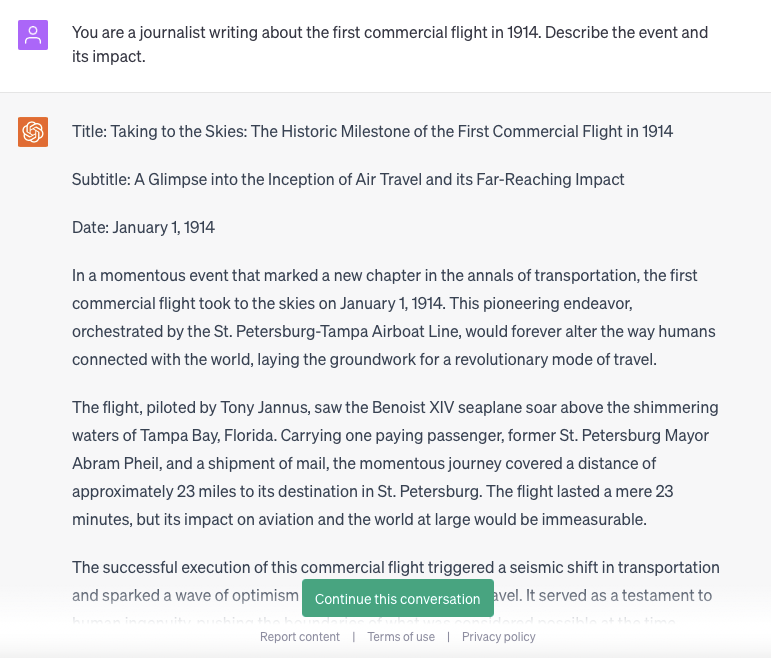
To hear the answer as an audio clip (generated by FreeTTS) click the play button below:
Answers to these prompts can give you an idea of the mindset and feelings of past times, and capture the gravity of historical events at the time they took place, more so than pure facts can.
Prompt 4: "What if" scenarios
 Do you want to dive deeper into the causes and effects of historical events, and better understand how one event lead to another?
Do you want to dive deeper into the causes and effects of historical events, and better understand how one event lead to another?
With "what if..." prompts ChatGPT can envision an alternative past and future, and thus highlight the consequences historical events have had.
Example ChatGPT prompts:
“If the French Revolution had not happened, what would the world be like today?”
“What if John F. Kennedy had survived the assassination attempt?"
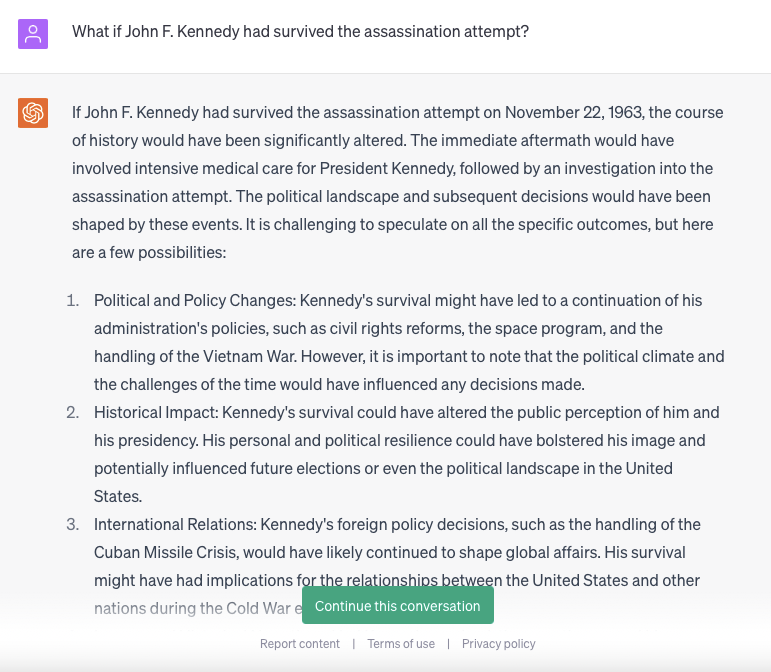
To hear the answer as an audio clip (generated by FreeTTS) click the play button below:
These prompts are a great way to train your analytical skills and understand the connections between single events. Be aware that all "what if" scenarios are speculation and not facts, but they do provide valuable insights into the impact of even small events.
Prompt 5: Exam preparation
 Sometimes you have to know exact facts and figures to make sense of history, that's why exams still focus on dates, definitions, and the like.
Sometimes you have to know exact facts and figures to make sense of history, that's why exams still focus on dates, definitions, and the like.
Use ChatGPT to come up with a history exam to test yourself. Be specific in your instructions so ChatGPT is giving away the correct answers!
Example prompt
"Write 5 multiple-choice questions with one correct answer and 3 distract answers on the topic of the French Revolution. Label each answer A to D. Do not give me the answers immediately and only after I entered them."
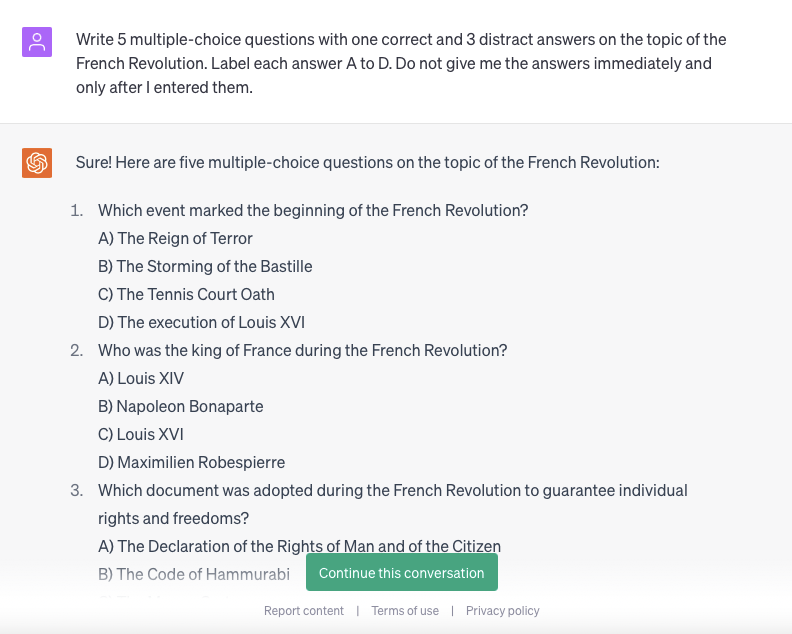
To hear the answer as an audio clip (generated by FreeTTS) click the play button below:
This prompt is a great way to memorize knowledge and find out how much about a topic you know already, and then dive deeper. Or try a variation and ask ChatGPT to quiz you on the most common exam questions regarding a specific historical topic.
Quiz: Study the American Civil War with ChatGPT
Tina is reading a historical novel set during the American Civil War, and coming from Sweden, she realizes she doesn't know much about US history.
 Photo by Priscilla Du Preez on Unsplash
Photo by Priscilla Du Preez on UnsplashWhat are some good ChatGPT prompts that will allow her to quickly learn more about the topic?
A. What if the South had won the US Civil War?
B. Pretend to be Abraham Lincoln. Explain your view of slavery and the South.
C. Discuss the impact of the Civil War from the perspective of a plantation owner and from the perspective of an abolitionist.
D. You're a reporter covering the Gettysburg Address. Describe the event and its atmosphere.
Quiz
Select the prompts that can help Tina learn more about the Civil War:
All the prompts are great options, and would help Tina learn more about the American Civil War in a quick and engaging way!
Take Action
ChatGPT is an effective tool to learn about history, and a great addition to textbooks and other sources.
But keep in mind: ChatGPT isn't free of errors and bias — fact-check critical information, and use your own critical thinking when reading AI-generated texts!

To get comfortable with the advantages and disadvantages of ChatGPT, try the following:
This Byte has been authored by
Silke Simons
Learning Designer